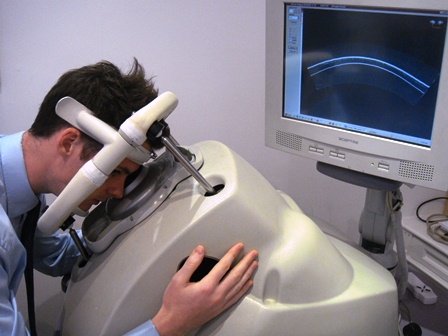NIH Grant Awarded To London Vision Clinic For Eye Disorder Screening
The highly prestigious RO-1 five year grant awarded by the National Institutes of Health (part of the U.S. Department of Health & Human Services) enables the clinic – together with colleagues at Columbia University in New York (where Dr Dan is a professor) – to continue their on-going work into screening and diagnosing the eye condition which is believed to affect around one person in a thousand.
Keratoconus causes structural changes within the cornea making it weaker so that over time it progressively thins and distorts. These changes create substantial distortion of vision. People with Keratoconus are therefore not candidates for Laser Eye Surgery. Screening for signs of Keratoconus is therefore a crucial part of any Laser Eye Surgery preoperative assessment.
At the London Vision Clinic this test is carried out using the Artemis Insight 100 VHF digital ultrasound scanner which was the first and remains the only system in the world that can fully map individual layers of the whole cornea, in particular the layer of skin (epithelium) overlying the cornea. The epithelium is about 50 microns in thickness – half the with of a human hair – and Dr Dan’s Artemis Insight 100 scanner can map the thickness of this layer with 1 micron precision in 3D. About 15 years ago, Dr Dan discovered that keratoconus alters the thickness of the epithelium of the cornea and this alteration can be diagnosed at its earliest stage by a distinctive pattern of epithelial thickness compared to that found in an eye without the condition. These uniquely accurate epithelial thickness profiles produced by the Artemis Insight 100 scanner enable patients coming to the London Vision Clinic for an assessment to be appropriately turned down for surgery, even though they had been told after conventional screening methods that they were good candidates. The other flip-side benefit of Artemis Insight 100 epithelial screening for Keratoconus is that 85% of patients who by conventional screening have been turned down for Laser Eye Surgery due to suspected Keratoconus are found to not have the condition and can proceed to have the procedure safely and with confidence. Dr Dan and colleagues have already published their method of screening in the scientific arena, including long terms studies supporting the validity of his method.
As many of you know, Professor Reinstein was the leading force behind the development of the Artemis Insight 100 scanner for epithelial mapping at Cornell University during the 1990s which – with its hugely superior imaging and micro-biometric capabilities – is known to provide the most accurate corneal measurements in the world. He was uniquely convinced that this line of research would lead to many benefits in the future. Together with Professor Ronald Silverman a computer scientist and ultrasound bioengineering expert, they were able to produce the first-ever epithelial maps of the human cornea in the early 1990’s. In addition to epithelial mapping, the Artemis Insight 100 scanner has proven to be the most effective way of repairing the complications of Laser Eye Surgery. One observer put it simply: “Dr Dan and his Artemis Insight 100 machine can fix things that no one else can measure”.
The Artemis Insight 100 scanner can only be found at a handful of clinics worldwide, as it is not yet widely commercialised. LoVC was the first clinic to have the Artemis Insight 100™, putting them in a unique position to be able to definitively say whether or not a patient has Keratoconus, where the results of other tests might not have shown any suspicion of the condition.



